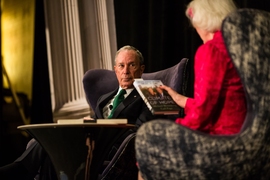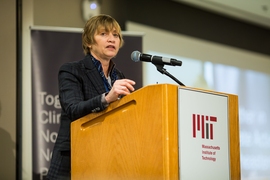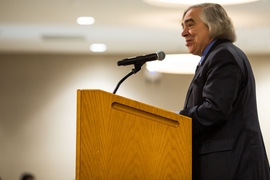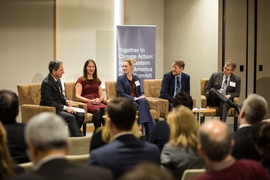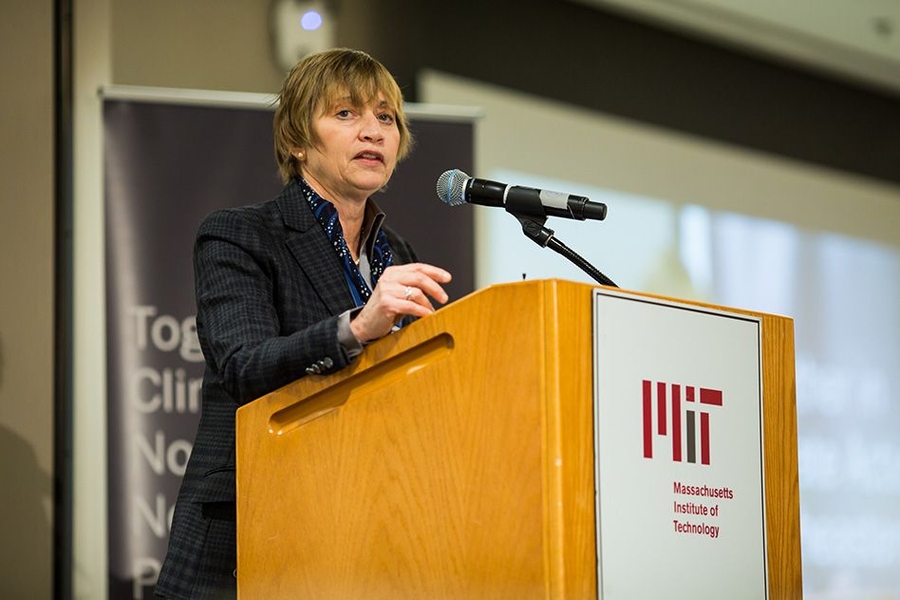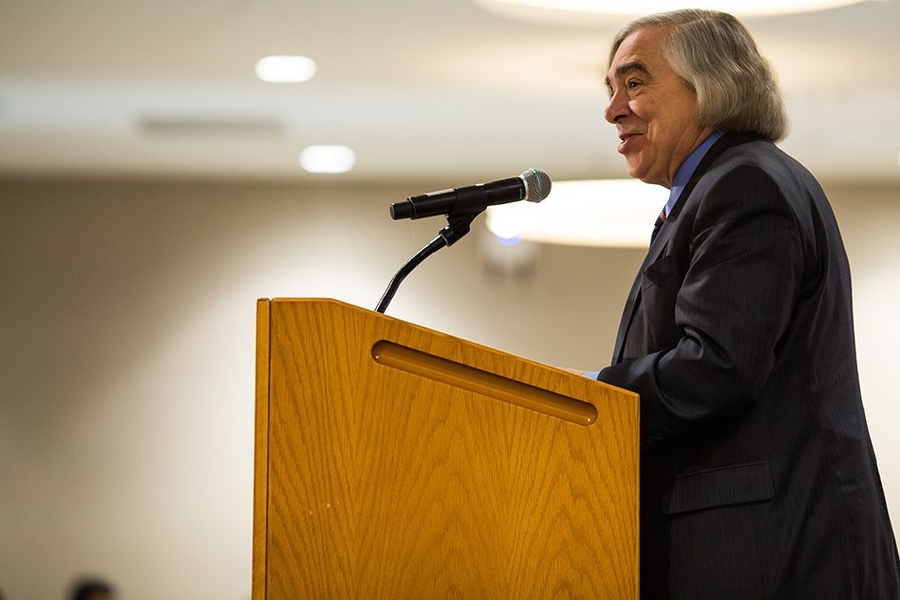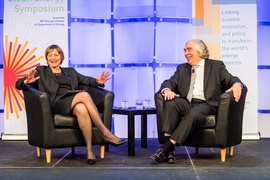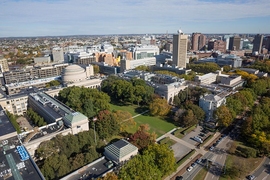Climate change is one of the biggest, most complex problems facing society today, and one that can only be solved through collaboration that draws different stakeholders together to work toward a common goal. This was the main message at last week’s climate summit at MIT, where almost 200 researchers, policymakers, and business and civic leaders from the northeastern United States and eastern Canada gathered for two days of panels and talks, sharing ideas and solutions, asking hard questions, and engaging in lively face-to-face debates and conversations that continued straight through coffee and lunch breaks.
The Dec. 7-8 conference, titled “Together in Climate Action: Northeastern North America Policy Summit,” marks the end of year two of MIT’s five-year action Plan for Action on Climate Change, in which the Institute committed to researching climate change, including solutions to mitigate and adapt to it; developing low-carbon energy technologies; increasing educational programs; creating new tools to share climate information; and reducing carbon use on the MIT campus.
“Contributing to climate solutions is one of our most important priorities at MIT,” Maria Zuber, MIT’s vice president for research, told the audience during her welcome address on Thursday morning. “Through research, education, and convening, our goal is to help advance strategies for rapidly and dramatically decarbonizing the global energy system and reducing greenhouse gas concentrations.”
Zuber went on to lay out three big goals for the summit: to highlight important work already happening in northeastern North America, to support collaborations across borders and between sectors, and to deepen the connection between researchers and policymakers.
Ernest Moniz, the former U.S. Secretary of Energy, expressed the need for continued collaborations between the United States and Canada during his opening remarks, where he also emphasized the importance of thinking about climate change on a multidecadal scale, and praised local governments and businesses in the U.S. for remaining committed to their climate change goals even as the federal government begins withdrawing from the Paris Agreement. Michael R. Bloomberg, the founder of Bloomberg L.P. and Bloomberg Philanthropies, and three-term mayor of New York City, also discussed the Paris Agreement in his keynote address on Thursday evening.
Moniz, who is the Cecil and Ida Green Professor of Physics and Engineering Systems Emeritus and a special advisor to MIT President L. Rafael Reif, cautioned the audience that when it comes to meeting climate change goals, “we’ve got to pick up the pace considerably,” which “must involve strong progress on the demand side, and [...] must involve decarbonization of the electricity sector.”
“I think the U.S. and Canada more broadly, New England and eastern Canada more specifically, really have opportunities, and we’re going to need to get every last drop of low-energy carbon that we can if we’re going to succeed in our task,” he said.
During a panel on the transition to a low-carbon economy, policymakers from Massachusetts and New York sat down with their counterparts from Newfoundland and Labrador and Quebec to discuss what they have accomplished and what challenges they are facing.
Jared Snyder, the deputy commissioner of air resources, climate change, and energy at the New York State Department of Environmental Conservation highlighted the Regional Greenhouse Gas Initiative (RGGI) as an example of how regional collaboration can lead to significant progress: According to Snyder, the program, which currently includes nine states, is on track to reduce carbon emissions from the power sector 50 percent by 2020, and will aim to reduce emissions another 30 percent by 2030. It has also resulted in over $2 billion of economic growth, which Snyder considers evidence that “we can support a vibrant economy at the same time as we reduce carbon emissions.”
Katie Theoharides, the assistant secretary of climate change for the Commonwealth of Massachusetts, also emphasized how efforts to combat climate change can be coupled with economic progress.
“I think one of the important things here in Massachusetts is that we don’t see climate change as a political issue,” she said. “It’s something where we really feel the solutions to climate change build on our innovation economy, allow us to really dig into our strengths on science and technology, and help us build stronger, more resilient communities while protecting the environment at the same time.”
Policymakers from Canada discussed their own successes amidst an entirely different set of challenges. Jackie Janes, the assistant deputy minister for the Government of Newfoundland and Labrador Office of Climate Change, described her province’s efforts to free up 3,100 megawatts of undeveloped hydroelectricity with the Muskrat Falls and Gull Island developments, which will provide the province with up to 98 percent renewable energy.
Éric Théroux, the assistant deputy minister for the Québec Ministry of Sustainable Development, the Environment and the Fight Against Climate Change, pointed to the cap-and-trade system Québec created with California. “It was the first-ever carbon market established between two federated states from separate countries, and it works really well,” he said, adding that it reduced carbon emissions while generating over $2 billion in revenue.
One of the liveliest discussions of the day also featured some of the most diverse perspectives, as Dan Gatti, a policy analyst for the Clean Vehicles program at the Union of Concerned Scientists; Stephanie Pollack, secretary and CEO of the Massachusetts Department of Transportation; Mike Tamor, a Henry Ford Technical Fellow at Ford Motor Company; and Jessika Trancik, associate professor of energy systems at MIT, delved into the complex issues surrounding decarbonization of the transportation sector.
Gatti offered his ideas about how the Northeast could decarbonize transportation, including a cap-and-trade program for transportation modeled after the RGGI. Gatti also pointed out that California is spending far more than the Northeast on decarbonizing transportation, including more than $200 million on clean transportation projects and $690 million this year on clean vehicle incentives.
Pollack, however, highlighted some of the challenges unique to transportation that hinder decarbonization efforts. She explained, for example, that it is much more difficult to define the social utility of transportation as compared to that of other sectors such as construction and electricity.
She also said that a cap-and-trade system worked well for electricity because people have a better sense of how much they are spending or saving per month, whereas “most people actually cannot answer the question, ‘how much a month do you spend on transportation?’” “In transportation, we just need to be thoughtful about what we don't know,” she said, adding that people’s behavior, which is a big part of transportation, is difficult to change, predict, and study.
Trancik emphasized the importance of research for quantifying transportation needs, and what new technologies and systems can accomplish. “I think practitioners and researchers have a lot of opportunities to work together to move from adjectives to numbers,” she said, adding that her own research has found that 90 percent of cars currently on the road could be replaced by an electric vehicle like the Nissan Leaf and still meet their daily driving needs.
Trancik also discussed the need to formulate reasonable steps toward decarbonization within different time frames. “I would encourage us all to think about the time series, so, think about the things that we can do now that don't require behavioral change, and be very conscious of what are the policy opportunities and innovation opportunities now, maybe using existing technologies but thinking about new business models for car sharing, what do we do in the medium term, and then all the way to the long term,” she said.
Other panels and talks on Thursday and Friday approached climate change from many angles, covering topics such as carbon pricing, nature-based solutions, and how states and provinces can work together on policy frameworks.
And while two days of intense discussions and debates made it clear that climate change is a nebulous problem with no easy answers, the summit also demonstrated the power of collaboration while initiating much-needed conversations between researchers and policymakers.
“We believe that significant progress will come through proactive engagement of government industry, civil society, and academia,” Zuber told a palpably engaged audience on Thursday morning. “With all of us working together to identify low-carbon solutions, reduce their cost, remove barriers to their adoption, and bring them to scale, we are optimistic that we can avoid the most serious consequences of climate change.”
